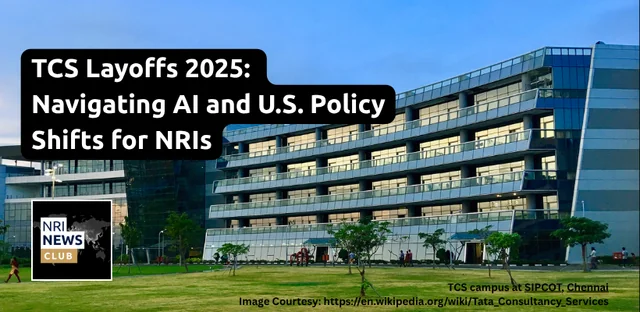In a shocking revelation that has sent ripples through India’s IT sector, a Tata Consultancy Services (TCS) insider exposed a troubling practice: employees being coerced to resign under the threat of negative feedback. The Reddit post, shared by a 21-year veteran of the company, detailed how project managers and the Resource Management Group (RMG) allegedly pressure employees to leave abruptly, bypassing standard protocols. This controversy, reported by The Financial Express on September 2, 2025, sheds light on broader issues of job security, workplace ethics, and the intersection with immigration policies for Indian professionals seeking opportunities abroad. For many TCS employees, particularly those navigating international assignments or visa processes, these practices exacerbate the already complex journey of immigration, cultural adaptation, and career stability. This article explores the interplay between India’s IT workforce dynamics, immigration challenges, visa policies, cultural integration, and the personal stories of Indian immigrants, offering practical guidance for those affected.
(The TCS Layoff Controversy and Its Immigration Context
The Indian IT industry, a cornerstone of the country’s economy, employs over 5 million professionals and contributes approximately 8% to India’s GDP. TCS, India’s largest IT services firm with a global workforce of over 600,000, has been a beacon of opportunity for engineers, many of whom aspire to work abroad through company-sponsored visas. However, the recent wave of layoffs—impacting 12,000 employees, or 2% of TCS’s global workforce—has raised alarms about job security and its implications for immigrants. The insider’s Reddit post revealed a disturbing trend: employees, even those with strong performance records, are given ultimatums to resign or face termination with damaging feedback, jeopardling fears of damaged career prospects, especially for those reliant on employer-sponsored visas like the H-1B in the United States or intra-company transfer permits in Europe.
(The practice, as described, involves HR pressuring employees with statements like, “Resign, otherwise we give you bad feedback,” offering three months’ salary as an incentive but threatening termination without severance if they refuse. This not only undermines employee morale but also complicates the lives of Indian professionals abroad, whose visa statuses are often tied to their employment. For immigrants, losing a job can mean losing legal residency, forcing them to navigate complex immigration systems under tight deadlines. The controversy has sparked outrage, with IT unions like the Union of IT & ITES Employees (UNITE) protesting in Chennai, labeling the layoffs “illegal” and demanding fair treatment.
(Visa Processes for Indian IT Professionals
For Indian IT workers, securing international assignments often involves navigating a labyrinth of visa processes. The H-1B visa, widely used by TCS employees for U.S. assignments, is a non-immigrant visa allowing skilled workers to stay for up to six years. In 2025, the U.S. Citizenship and Immigration Services (USCIS) capped H-1B visas at 85,000 annually, with fierce competition among applicants. TCS, as a top H-1B sponsor, facilitates thousands of applications yearly, requiring employees to provide proof of specialized skills, a job offer, and a Labor Condition Application (LCA) ensuring fair wages. However, the abrupt terminations reported at TCS jeopardize these visas, as employees must find new sponsors within 60 days or face deportation.
(In Europe, intra-company transfer (ICT) permits under the EU Blue Card scheme are common for TCS employees. These permits require a minimum salary threshold (approximately €60,000 in 2025) and proof of employment with the same company for at least six months. The UK’s Skilled Worker visa, another option, demands a Certificate of Sponsorship (CoS) from TCS and a minimum salary of £38,700. For Indian employees, sudden job loss can disrupt these processes, leaving them scrambling to secure new employment or return to India. Key tip: Always maintain updated documentation, including employment contracts and payslips, to streamline visa transitions if needed.
Practical steps for visa applications include:
1. Consult with HR early: Verify visa sponsorship details and timelines with your employer before international transfers.
2. Engage immigration lawyers: Firms like Fragomen or Berry Appleman & Leiden specialize in H-1B and ICT visas, offering guidance on appeals or transfers.
3. Monitor visa status: Use tools like the USCIS Case Status Online tracker to stay updated on application progress.
4. Prepare for contingencies: Maintain a financial buffer and network with other employers to mitigate risks of sudden job loss.
Challenges of Job Insecurity and Immigration
The TCS insider’s revelations highlight a broader challenge: the precarious nature of job security in the IT sector, particularly for immigrants. Indian professionals on H-1B visas in the U.S. face a “use it or lose it” scenario, where job loss triggers a 60-day grace period to find new employment or leave the country. This pressure is compounded by cultural and financial challenges, as many support families in India or invest heavily in U.S. living costs. The Reddit post described an employee with 21 years at TCS, who, despite a consistent “A band” rating, was forced to resign without notice, illustrating the emotional toll of such practices. “Tears in eyes and asks why? I have worked hard,” the employee pleaded, only to be met with a dismissive smile from HR.
(For those in Europe, the situation is similarly dire. The EU Blue Card, while offering flexibility across member states, requires continuous employment. Losing a job can lead to permit revocation, forcing immigrants to navigate multiple national bureaucracies. In the UK, the Skilled Worker visa ties employees to specific roles, and a layoff can mean restarting the sponsorship process. These challenges are particularly acute for mid- and senior-level employees, who, as TCS’s CEO K Krithivasan noted, are the primary targets of the 2025 layoffs due to “skill mismatches.”
(Coping strategies include upskilling in high-demand areas like AI, cybersecurity, and cloud computing. Platforms like Coursera and Udemy offer affordable certifications, while TCS’s own iON platform provides internal training. However, the insider’s post suggests that certifications and project feedback are often disregarded, leaving employees vulnerable. “No one cares about your T factor score, no one cares about your certifications,” the Redditor lamented, highlighting a disconnect between employee effort and corporate priorities.
(Personal Stories: Navigating Uncertainty
The human cost of these practices is evident in stories like that of Arjun, a 38-year-old TCS engineer based in New Jersey on an H-1B visa. After 12 years with the company, Arjun was informed his role was “non-critical” and faced the ultimatum to resign or be terminated. “I had two kids in school and a mortgage,” he shares. “The HR call felt like a betrayal. They offered three months’ pay, but finding a new sponsor in 60 days was a nightmare.” Arjun eventually secured a role with a smaller tech firm, but the stress of nearly losing his visa status took a toll on his family. His story reflects the broader anxiety among TCS’s immigrant workforce, many of whom fear deportation and financial ruin.
(Contrastingly, Priya, a 29-year-old TCS employee in London, turned her layoff into an opportunity. After being released from a project in 2024, she leveraged her network to secure a role with a UK-based fintech startup. “I was terrified of losing my Skilled Worker visa,” she says. “But I used LinkedIn to connect with recruiters and upskilled in data analytics during my notice period.” Priya’s proactive approach highlights the importance of adaptability, a lesson echoed by an Indian IT engineer on Reddit: “Don’t wait for a trigger to upskill. Am I creating real value? What new skills have I gained this quarter?”
(“The fear of losing my visa kept me up at night,” Arjun recalls. “But it also pushed me to fight harder for my family’s future.”
Cultural Integration: Balancing Identity and Adaptation
For Indian IT professionals abroad, cultural integration is a significant challenge, particularly amid job insecurity. In the U.S., Indian immigrants often navigate a fast-paced, individualistic culture that contrasts with India’s collectivist ethos. Language barriers, while less common for English-proficient IT workers, persist in social settings, where accents or colloquialisms can lead to misunderstandings. In Europe, cultural differences vary by country—Germany’s formal work culture differs from the UK’s more relaxed approach—requiring immigrants to adapt quickly.
Practical tips for cultural integration include:
1. Join community groups: Organizations like the Indian Professionals Network in the U.S. or the British Indian Association offer cultural events and networking opportunities.
2. Learn local customs: Understanding workplace norms, such as punctuality in Germany or casual Fridays in the UK, builds rapport with colleagues.
3. Seek mentorship: Connecting with senior Indian immigrants can provide guidance on navigating cultural nuances.
4. Embrace hybrid identities: Celebrate Indian festivals like Diwali while participating in local events like Thanksgiving to bridge cultures.
Rahul, a TCS employee in Munich, struggled initially with Germany’s direct communication style. “In India, we soften feedback, but here, it’s blunt,” he says. By joining a local Indian diaspora group, he found a balance, hosting Bollywood nights that attracted German colleagues. “It was my way of sharing my culture while learning theirs,” he explains. Such efforts foster belonging, crucial for immigrants facing workplace uncertainty.
Legal Guidance and Policy Updates
The TCS layoffs have drawn scrutiny from IT unions, who argue that forced resignations violate India’s labor laws, including the Industrial Disputes Act, 1947, which mandates notice and consultation for terminations. The Nascent Information Technology Employees Senate (NITES) filed a complaint with the Ministry of Labour and Employment, calling for reinstatement or fair compensation. “TCS has planned to terminate thousands without due notice,” said NITES president Harpreet Singh Saluja, highlighting the legal risks for employees coerced into resigning.
(For immigrants, understanding visa regulations is critical. In the U.S., H-1B holders can apply for a change of status (e.g., to a B-2 visitor visa) if they lose employment, but this requires swift action. In the EU, Blue Card holders must notify authorities within one month of job loss. The UK’s Skilled Worker visa allows a 60-day grace period, but re-sponsorship is challenging without a new CoS. Legal advice: Engage with organizations like the American Immigration Lawyers Association (AILA) or the European Immigration Network for support.
Recent policy changes add complexity. The U.S. tightened H-1B scrutiny in 2025, requiring additional evidence of “specialty occupation” qualifications. The EU introduced stricter Blue Card salary thresholds, while the UK raised the Skilled Worker visa salary requirement by 10% to account for inflation. These shifts make it harder for laid-off TCS employees to secure new sponsors, emphasizing the need for proactive career planning.
(Success Stories Amid Adversity
Despite the challenges, many Indian IT professionals have turned layoffs into opportunities for growth. Take Anjali, a 35-year-old former TCS employee in Toronto. After being forced to resign in 2024, she used her severance to fund a master’s degree in AI at the University of Toronto. “The layoff was a wake-up call,” she says. “I realized I needed to pivot to stay relevant.” Today, Anjali works as a machine learning engineer, a role in high demand across Canada’s tech sector. Her story underscores the importance of upskilling, a sentiment echoed by TCS’s CEO, who clarified that layoffs target “skill mismatches” rather than AI-driven redundancies.
(Similarly, Vikram, a 42-year-old TCS veteran in Australia, faced a forced resignation but leveraged his network to join a Sydney-based startup. “I was devastated, but I used my notice period to certify in cloud computing,” he shares. His new role offers a higher salary and permanent residency prospects, highlighting how resilience and adaptability can lead to success. These stories offer hope, showing that while the TCS layoffs are disruptive, they also push employees to reinvent themselves.
“The layoff felt like the end, but it was a new beginning,” Anjali reflects. “I found my passion in AI and a community that supported me.”
Looking Ahead: Navigating an Uncertain Future
The TCS controversy, coupled with broader IT sector layoffs, signals a pivotal moment for Indian professionals. The industry’s shift toward AI and automation demands continuous upskilling, particularly for immigrants whose visa statuses hinge on employment. TCS’s announcement of salary hikes for 80% of its workforce, alongside the layoffs, has fueled perceptions of cost-cutting disguised as restructuring. UNITE’s protest placards, labeling TCS leadership as “Chief of Corporate Greed,” reflect the depth of employee frustration.
(For immigrants, the stakes are higher. Losing a job can mean losing a visa, uprooting families, and facing financial strain. Yet, stories like Priya’s, Anjali’s, and Vikram’s show that resilience, networking, and upskilling can open new doors. Key advice: Build a financial safety net, diversify skills, and engage with diaspora networks to navigate layoffs and visa challenges. As India’s IT sector evolves, so must its workforce, balancing cultural roots with global aspirations.
The TCS insider’s revelations have exposed not just workplace issues but also the broader struggles of Indian immigrants in a globalized economy. From visa hurdles to cultural adaptation, their journey is one of resilience, adaptation, and hope. By staying informed, leveraging legal support, and embracing continuous learning, Indian professionals can navigate these challenges and thrive in an uncertain world.













0 Comments